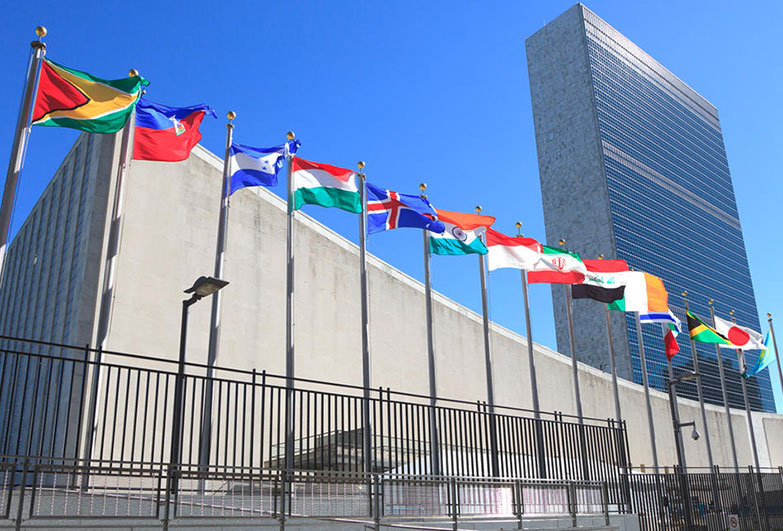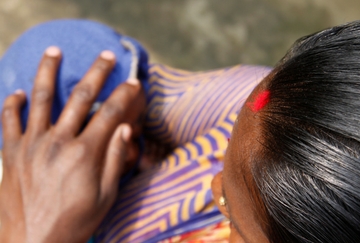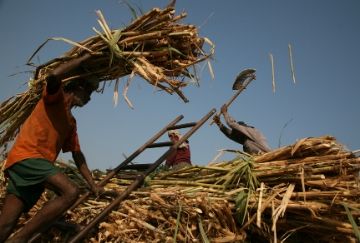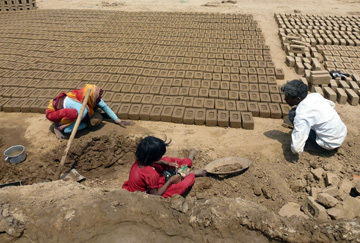Our work internationally

Anti-Slavery International works to shape, uphold and improve the international legal framework on slavery to better protect the millions of people affected by slavery across the world. We campaign and advocate at the international level – where governments engage, negotiate and report to each other around these frameworks – and link this with the campaigning that our partners and colleagues do in-country.
International anti-slavery protections
Slavery, and all its forms, is defined and prohibited in various international legal standards, including:
- The United Nations (UN) Slavery Convention (1926)
- The UN Supplementary Convention on the Abolition of Slavery, the Slave Trade, and Institutions and Practices Similar to Slavery (1956)
- The International Labour Organisation (ILO) Conventions on Forced Labour: No. 29 (1930) and No. 105 (1957), and the Protocol to the Forced Labour Convention (2014)
- The ILO Convention No. 182 on the Worst Forms of Child Labour (1999)
These form a bedrock of global protections against slavery. The prohibition of slavery is one of the highest ‘norms’ of international law, sitting alongside genocide, aggression, torture and piracy. Under this legal principle, there are no circumstances in which Governments can be exempt from prohibiting slavery.
The prohibition of slavery is part of customary international law, so States are bound by the obligation, whether or not they have signed up to certain Conventions. All governments must therefore make sure that their national laws and practice fit this obligation. However, many governments are failing on this front, potentially leaving people vulnerable to slavery and without protection and support.
How we work internationally
Working with these frameworks, we keep slavery on the agenda of international institutions, such as the UN, and we influence international policy-making to keep anti-slavery provisions strong and relevant. Engaging with different mechanisms – among them the Human Rights Council, the Universal Periodic Review, UN experts such as the Special Rapporteur on contemporary forms of slavery, and the ILO (the labour-focused UN agency) – we send evidence submissions, provide policy positions and recommendations, speak out at conferences, and submit complaints when governments fail on their commitments. To do this we work closely with partners, affected communities and other NGOs, as well as governments, trade unions and employers’ organisations.
Watch an Instagram reel of our International Advocacy Team in 2023 at the ILO’s International Labour Conference here, and at the Human Rights Council here.
National and international advocacy
We work with our partners to take priorities, messaging and evidence from affected communities at national and community levels to high-profile decision-making spaces.
This can be especially important where advocacy inside a country is blocked, restricted or dismissed. Sometimes a government will only make key changes if pressure is coming from many different directions – including from the ‘top’, from international experts and other governments.
We also help our partners make full use of States’ international obligations and commitments when campaigning at home.
Campaigning at the national level can be enhanced when it shows that a government is breaking commitments it has made internationally. This two-way street – between national and international advocacy – means more powerful change-making for and with people affected by slavery.
History
For over a century, our movement has helped build the international legal framework against slavery. Anti-Slavery International, as we know it today, was founded as the British and Foreign Anti-Slavery Society in 1839 by members of the movement that was fighting for the end of the transatlantic slave trade. International advocacy was as important to the anti-slavery movement then as it is now. Back then, it involved helping to establish the first comprehensive anti-slavery treaty in 1890 (the Brussels Act), lobbying for the League of Nations Slavery Convention in 1926 (now known as the UN Slavery Convention of 1926), and influencing the content of the 1956 UN Supplementary Convention on the Abolition of Slavery, which set down in international law the need to end contemporary forms of slavery – including debt bondage and forced marriage. More recently, Anti-Slavery International successfully lobbied for the appointment of a UN Special Rapporteur on contemporary forms of slavery (achieved in 2008) and for a clause dedicated to child domestic workers in the ILO Convention on Decent Work for Domestic Workers in June 2011. Read more about our history here.
What impact can international advocacy have?
Our advocacy at the international level has contributed to real change.
1. Child-led advocacy at the ILO
Between 2010-2011 we successfully advocated for specific clauses to be in the new ILO Domestic Workers Convention to protect child domestic workers. The campaign involved working closely with current and former child domestic workers, including through setting up Advisory Committees to enable child domestic workers to contribute to project policy, strategy, outreach and advocacy. Ten children travelled to Geneva to undertake face-to-face lobbying with governments, employers and trade unions at the ILO’s annual International Labour Conference in 2010 and 2011. This participatory child advocacy on the international stage played a key role in the ultimate success of the campaign. Read more about this project here.
2. Multilateral pressure to end the use of child camel jockeys in the UAE
In 2005, an Anti-Slavery International campaign led to the United Arab Emirates (UAE) banning the use of child camel jockeys, which had seen children as young as four years old trafficked from places such as Bangladesh, Pakistan and Sudan, and taken to camps where they were abused and forced to ride camels in dangerous conditions. Advocacy at the UN and ILO level was key. When the UAE Government issued denials, we gathered evidence – including case studies, children’s testimonies, and media sources – and shared with the UN and ILO. This led the ILO to call on the UAE to change the situation and was picked up widely in global media. The UAE was obliged to accept that children were commonly being abused in this way and agree to an ILO visit to assess the problem. The UAE banned camel racing for anyone under 18 shortly afterwards, and repatriated and compensated 3,000 children. Similar laws were then passed in Kuwait, Qatar, Oman and Saudi Arabia.
3. International campaigning to end state-imposed forced labour in the Uzbek 2021 cotton harvest
In March 2022, we celebrated the historic achievement of state-imposed forced labour being eliminated in the 2021 Uzbek cotton harvest. The preceding 15 years of intense campaigning led by Uzbek and international civil society – including the Cotton Campaign, which Anti-Slavery International has been part of for over a decade – had directly and vitally involved key international organisations. This included advocacy with the European Union, the ILO and the UN to put pressure on the Uzbek Government to end forced labour, and a civil society complaint to the independent accountability mechanism of the World Bank, regarding its investments in the Uzbek cotton sector. Read more about our campaign.
Some more examples of our impact at the international level:
Our work in partnership
Our advocacy is most impactful when we work in partnership, and we support people affected by slavery to inform and influence international agendas. While not everyone may feel they have access to international institutions like the UN and ILO, there are many ways to engage. Anti-Slavery International is on the ILO Special List of NGOs and is accredited with the UN Economic and Social Council (ECOSOC), meaning that we have a strong level of access to both institutions, and a history of working out how to use it effectively. Crucially, this means we can share this knowledge and access with partners including:
- OKUP and Anti-Slavery International statement at the 53rd Human Rights Council, highlighting the link between climate-induced migration, displacement & slavery
- Anti-Slavery International, SOS Esclaves, Temedt and Timidria submission on slavery affecting minorities to the UN Special Rapporteur on contemporary forms of slavery
- Joint submission on human trafficking and modern slavery by 16 UK-based NGOs for the Universal Periodic Review of the UK


